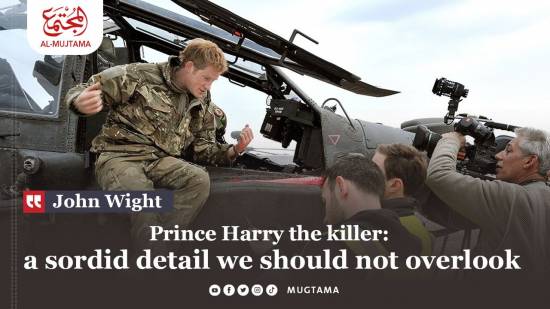Prince Harry the killer: a sordid detail we should not overlook Featured
In his ill-advised confessional Spare, the Prince boasts of killing 25 supposed Taliban fighters at distance from an attack helicopter ‘only to prevent further loss of life’ — what scandalous nonsense, writes JOHN WIGHT
AMID the deluge of royal angst unleashed by Prince Harry in his autobiography, Spare, his treatment of his time on deployment to Afghanistan flying Apache helicopters is easily the most salient in that it provides an insight into the diseased and murderous mind of those programmed to kill on command in the name of Western “civilisation.”
In extracts from the book published by the BBC, after revealing that he killed 25 people during his two tours of the country, Harry goes on to reveal: “It wasn’t a statistic that filled me with pride but nor did it leave me ashamed.”
Continuing, he offers: “When I found myself plunged in the heat and confusion of combat I didn’t think of those 25 as people. They were chess pieces removed from the board. Bad people eliminated before they could kill good people.”
Where to begin?
With the above rendering of Afghans as unpeople — as mere chess pieces removed from the board — our benighted Prince reveals the racist character of Britain’s long history of colonial wars.
Worse than Harry boasting of his exploits as a “Taliban killer” was the manner in which at the time every mainstream newspaper carried it across their front and inside pages without a word of criticism attached; eminently proud, as they were, of his martial might.
Of course, the Prince was quick to qualify his boast with the assertion that it was an exercise in “taking a life to save a life.” Well, not according to the website Costs of War, which estimates that 70,000 Afghan and Pakistani civilians were killed in Afghanistan between 2001, when hostilities began, and 2020, when Britain and the US withdrew from the country.
Who’s to say that one of the bullets fired by the Prince did not find its way into the body of an Afghan civilian, perhaps an old man, woman, or child?
The sheer number of civilians slaughtered tells its own story here, surely. Of course, such subtleties were lost at the time amid the eruption of patriotic fervour over the Prince’s exploits of military derring-do.
On a much wider and more serious level this story, the way in which a member of the so-called royal family feels so comfortable in boasting publicly of the fact he personally killed while on active service, is further evidence of the extent to which a war culture is part and parcel of British society — normalised, sanitised, and in some quarters deified as a motive force of British values and the nation’s place in the world.
Social historians will look back and see this as a consequence of the brave, determined but ultimately failed attempt of the anti-war movement at its height in the run-up to the wars in Afghanistan and Iraq to halt the Blair government’s determination to join the US as it embarked on an era of war without end.
The innocent dead of Afghanistan
Not only has it resulted in disastrous consequences for the victims of said wars in Afghanistan, Iraq, Libya and more, but it also heralded a polarised and rightward shift in society at home, reflected in the imperviousness of the country’s political establishment to the suffering of the poor and vulnerable under that mass experiment in human despair otherwise known as austerity.
Among the millions nailed to this particular cross have been thousands of military veterans dealing with the ravages of PTSD but, unlike Harry, without the support of the best medical treatment that money can buy.
The bald truth is that Harry’s role in Afghanistan as part of an Apache helicopter crew was both base and cowardly. It does not take courage to fly over one of the poorest countries in the world in the most advanced attack helicopter there is, shooting at people armed only with small arms from a considerable distance away.
Neither is it noble to be part of a military occupation that only succeeded in perpetuating the suffering of an entire people in violation of their dignity, self-determination, and human rights.
There is nothing heroic about colonialism and imperialism. It is a cancer in our world, one responsible for huge suffering and the loss of innocent life on a grand scale.
Bad enough that we send young men, the majority from low-income communities, to kill and be killed or maimed in the interests of a political establishment that in truth cares not one jot about their welfare. But to have this sickening spectacle added to buy Harry pimping himself as a poster boy for Apache helicopters takes it to a whole other level.
Perhaps now some enterprising company will produce a video game in his honour, one in which the object is to kill as many Taliban from the cockpit of an Apache within a certain time frame, losing points every time you mistakenly blast a civilian.
Perhaps there will be a new Prince Harry Action Man produced in time for next Christmas, replete in desert fatigues and aviator sunglasses.
Harry is not the victim he has gone out of his way to cultivate in the public mind. He’s an entitled fool whose insights into the machinations of the royals only further make the case for the abolition of this rancid and arcane institution, along with the class system it represents and upholds.
Ultimately, only when we as a society weep for the victims of the Harrys of our world will we know that progress is being made.
Source: morningstaronline


